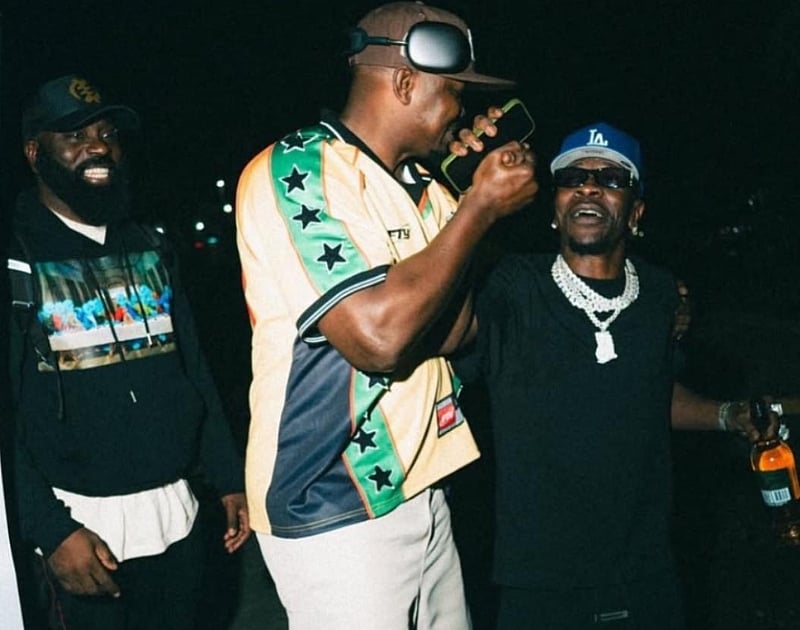Blakk Cedi’s public display of support for Shatta Wale at the Freedom Street concert in Jamaica has sent ripples through the Ghanaian music scene, sparking discussions and debates across social media platforms. His presence at the concert, captured in widely circulated videos, is seen as a significant endorsement of Shatta Wale’s artistry and a powerful gesture of unity, especially in the context of prior tensions and perceived rivalries within the industry. This act transcends mere professional courtesy; it represents a symbolic bridging of divides and a celebration of Ghanaian music on an international stage. The context of Stonebwoy’s previous dismissive remarks regarding Shatta Wale’s participation further amplifies the significance of Blakk Cedi’s actions. By openly supporting Shatta Wale, Blakk Cedi challenges the narrative presented by Stonebwoy and underscores the importance of recognizing and celebrating the achievements of fellow Ghanaian artists.
Shatta Wale’s invitation to perform at the Freedom Street concert was a milestone in itself, marking him as the sole Ghanaian artist to grace the stage of this iconic event. This recognition speaks volumes about his growing international profile and the impact of his music beyond Ghana’s borders. The concert’s significance is further heightened by its historical context – a triumphant return after a period of hiatus following the incarceration and subsequent release of its founder, Vybz Kartel. This resurgence, featuring a carefully curated lineup of artists from Africa and the Caribbean, positioned the Freedom Street concert as a pivotal moment in Jamaican music history and a celebration of the genre’s global reach. Shatta Wale’s inclusion in this lineup solidifies his place among a select group of international artists chosen to participate in this landmark event.
Stonebwoy’s downplaying of Shatta Wale’s participation in the concert added another layer of complexity to the narrative. His comments, suggesting that Shatta Wale’s role was merely that of a curtain-raiser and implying a lack of genuine artistic merit, created a point of contention within the Ghanaian music community. This dismissive stance not only undermined Shatta Wale’s achievement but also fueled existing tensions between the two artists and their respective fan bases. Stonebwoy’s assertion that he would not resort to “famzing” international artists to gain recognition further highlighted his perceived disconnect from the spirit of collaboration and mutual support that Blakk Cedi’s actions embodied.
Blakk Cedi’s presence in Jamaica served as a direct counterpoint to Stonebwoy’s narrative. By actively supporting Shatta Wale, Blakk Cedi implicitly challenged the notion that his participation was insignificant. This gesture transcended personal loyalties and spoke to a broader message of unity and mutual respect within the Ghanaian music industry. It demonstrated a willingness to celebrate the success of a fellow artist, regardless of past differences or perceived rivalries. This public display of solidarity stood in stark contrast to Stonebwoy’s dismissive remarks, highlighting the differing perspectives within the industry and the ongoing debate about collaboration versus competition.
The Freedom Street concert, with its rich history and cultural significance, served as the backdrop for this unfolding drama. Vybz Kartel’s return to the helm after his period of incarceration infused the event with a sense of renewal and triumph. The concert’s focus on showcasing a diverse range of artists from across the African diaspora and the Caribbean underscored the global interconnectedness of music and the power of cultural exchange. Shatta Wale’s inclusion in this lineup was a testament to his growing influence and his ability to transcend geographical boundaries with his music. The concert’s significance as a cultural moment magnified the impact of Blakk Cedi’s support for Shatta Wale, transforming it into a statement about unity and solidarity within the broader context of African and Caribbean music.
The ripples of Blakk Cedi’s actions continue to spread throughout the Ghanaian music scene and beyond. The public nature of his support for Shatta Wale has sparked widespread conversation and debate, forcing a re-examination of the dynamics within the industry. It has highlighted the importance of recognizing and celebrating the achievements of fellow artists, even amidst competition and perceived rivalries. Blakk Cedi’s gesture serves as a powerful reminder of the potential for unity and collaboration within the music industry, challenging the prevailing narrative of cutthroat competition and promoting a more inclusive and supportive environment. This incident has the potential to reshape the landscape of Ghanaian music, fostering a greater sense of camaraderie and mutual respect among artists and encouraging a more collaborative approach to artistic growth and development.


